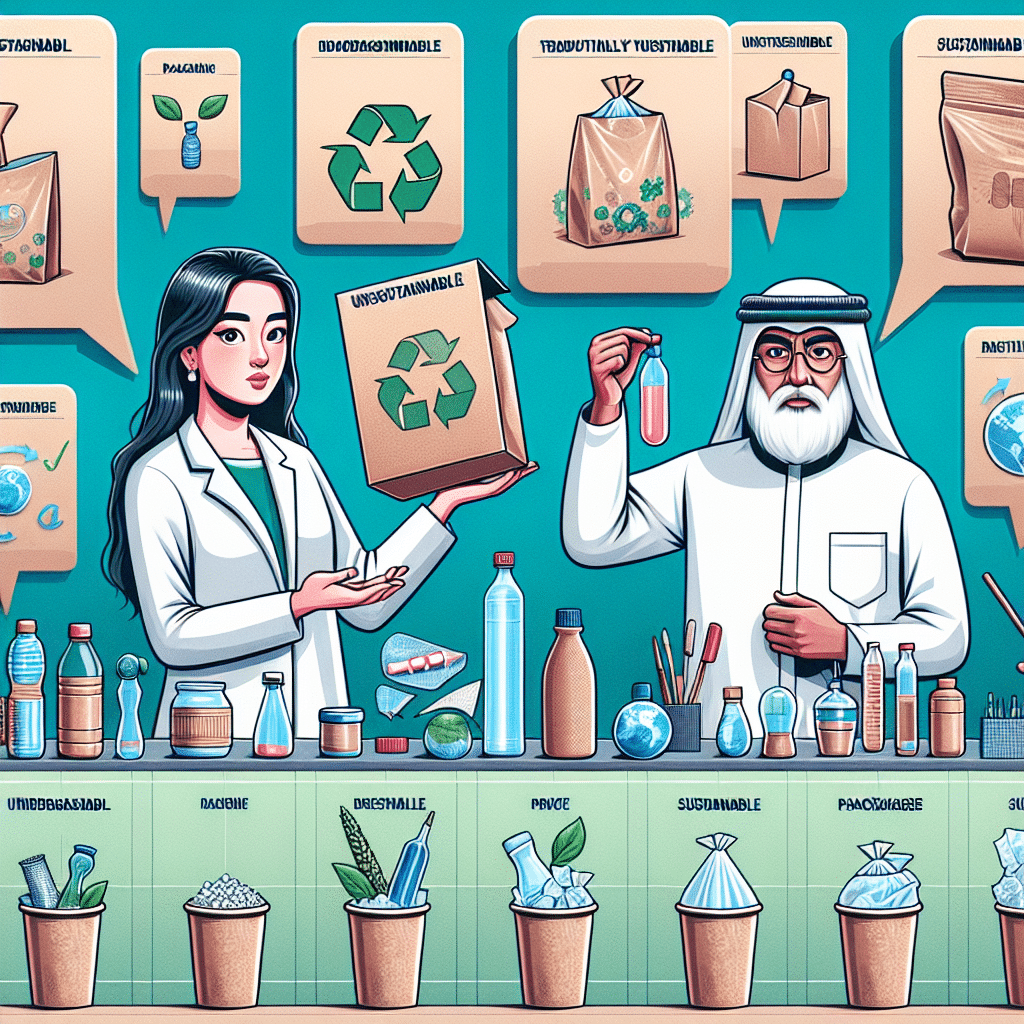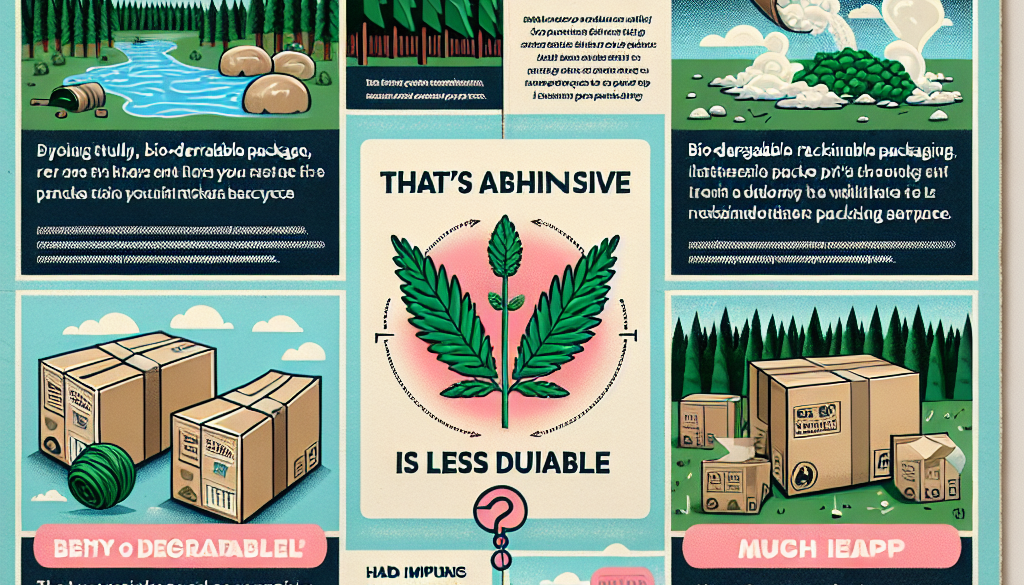Breaking Myths about Sustainable Packaging
-
Table of Contents
- Sustainable Packaging Myths Debunked: The Truth Behind Eco-Friendly Practices
- Myth 1: Sustainable Packaging is Always More Expensive
- Myth 2: Sustainable Packaging Doesn’t Perform as Well
- Myth 3: Recycling is the Only Aspect of Sustainable Packaging
- Myth 4: Consumers Don’t Really Care About Sustainable Packaging
- Myth 5: Biodegradable and Compostable Packaging Always Benefit the Environment
- Conclusion: Embracing the Reality of Sustainable Packaging
- ETprotein: Your Partner in Sustainable Nutrition
Sustainable Packaging Myths Debunked: The Truth Behind Eco-Friendly Practices

In recent years, sustainable packaging has become a buzzword in the consumer goods industry, with companies and customers alike seeking ways to reduce their environmental footprint. However, as with any emerging trend, misconceptions and myths have arisen around sustainable packaging. This article aims to dispel some of these myths, providing a clearer understanding of what sustainable packaging truly entails and its benefits.
Myth 1: Sustainable Packaging is Always More Expensive
One of the most common misconceptions is that eco-friendly packaging solutions are prohibitively expensive compared to traditional options. While it’s true that some sustainable materials may come with a higher initial cost, the long-term savings and benefits often outweigh these initial investments.
- Reduced shipping costs due to lighter and more efficient packaging designs.
- Lower waste disposal fees as a result of using biodegradable or recyclable materials.
- Increased brand loyalty and customer satisfaction, as consumers are willing to support environmentally responsible companies.
Moreover, as demand for sustainable materials grows, economies of scale come into play, driving down costs. According to a study by the Sustainable Packaging Coalition, the market for sustainable packaging is expected to reach $413.8 billion by 2027, indicating a growing affordability and accessibility of these materials.
Myth 2: Sustainable Packaging Doesn’t Perform as Well
Another myth is that eco-friendly packaging is less durable or effective than traditional packaging. However, many sustainable materials are specifically engineered to match or even surpass the performance of their conventional counterparts.
- Innovative designs using recycled content can be just as strong and protective.
- Bioplastics and other plant-based materials have been developed to provide excellent barrier properties.
- Advancements in technology have led to sustainable packaging solutions that are suitable for a wide range of products, including those with specific temperature or moisture requirements.
For instance, a study published in the Journal of Cleaner Production found that certain types of biodegradable packaging can provide similar shelf-life extension for fresh produce as conventional plastic packaging.
Myth 3: Recycling is the Only Aspect of Sustainable Packaging
While recycling is a crucial component of sustainability, it is not the only factor to consider. Sustainable packaging encompasses a broader approach, including:
- The use of renewable resources in the production of packaging materials.
- Designing for end-of-life, ensuring that packaging can be easily recycled, composted, or reused.
- Minimizing the carbon footprint throughout the packaging’s lifecycle, from production to disposal.
It’s important to recognize that a holistic view of sustainability also includes the social and economic impacts of packaging choices, such as supporting fair labor practices and contributing to local economies.
Myth 4: Consumers Don’t Really Care About Sustainable Packaging
Contrary to this belief, consumer demand for sustainable packaging is on the rise. A Nielsen report revealed that 73% of global consumers would definitely or probably change their consumption habits to reduce their environmental impact. This shift in consumer behavior is prompting companies to take sustainable packaging more seriously as a way to meet customer expectations and stay competitive in the market.
Myth 5: Biodegradable and Compostable Packaging Always Benefit the Environment
While biodegradable and compostable materials are often touted as environmentally friendly, they are not a one-size-fits-all solution. The benefits of these materials depend on proper disposal and industrial composting facilities, which may not be readily available in all areas.
- Biodegradable packaging requires specific conditions to break down, which may not occur in landfills.
- Compostable packaging needs to be processed in industrial composting facilities, which are not accessible to everyone.
- Without proper infrastructure, these materials may not offer any advantage over traditional plastics in terms of reducing environmental impact.
Therefore, it’s essential to consider the end-of-life scenario for packaging materials and to support the development of appropriate waste management systems.
Conclusion: Embracing the Reality of Sustainable Packaging
In conclusion, sustainable packaging is not just a trend but a necessary shift towards more responsible consumption and production practices. By debunking the myths surrounding it, we can better understand the complexities and opportunities that sustainable packaging presents. It’s about making informed choices that consider the entire lifecycle of packaging materials and their impact on the environment.
As consumers become more environmentally conscious, businesses have the opportunity to lead the way in adopting sustainable packaging solutions that are cost-effective, high-performing, and truly beneficial for the planet.
ETprotein: Your Partner in Sustainable Nutrition
As we strive for sustainability in all aspects of our lives, it’s important to choose products that align with these values. ETprotein offers a range of organic bulk vegan proteins and L-(+)-Ergothioneine (EGT) that cater to health-conscious consumers looking for eco-friendly nutrition options. Their products are non-GMO, allergen-free, and characterized by a neutral taste, making them an excellent choice for those seeking sustainable and high-quality protein sources.
Whether you’re a distributor, trader, or manufacturer in the food and beverage or nutraceutical industry, ETprotein can provide you with tailor-made protein solutions that meet your needs while supporting your commitment to sustainability.
About ETprotein:
ETprotein, a reputable protein and L-(+)-Ergothioneine (EGT) Chinese factory manufacturer and supplier, is renowned for producing, stocking, exporting, and delivering the highest quality organic bulk vegan proteins and L-(+)-Ergothioneine. They include Organic rice protein, clear rice protein, pea protein, clear pea protein, watermelon seed protein, pumpkin seed protein, sunflower seed protein, mung bean protein, peanut protein, and L-(+)-Ergothioneine EGT Pharmaceutical grade, L-(+)-Ergothioneine EGT food grade, L-(+)-Ergothioneine EGT cosmetic grade, L-(+)-Ergothioneine EGT reference grade and L-(+)-Ergothioneine EGT standard. Their offerings, characterized by a neutral taste, non-GMO, allergen-free attributes, with L-(+)-Ergothioneine purity over 98%, 99%, cater to a diverse range of industries. They serve nutraceutical, pharmaceutical, cosmeceutical, veterinary, as well as food and beverage finished product distributors, traders, and manufacturers across Europe, USA, Canada, Australia, Thailand, Japan, Korea, Brazil, and Chile, among others.
ETprotein specialization includes exporting and delivering tailor-made protein powder and finished nutritional supplements. Their extensive product range covers sectors like Food and Beverage, Sports Nutrition, Weight Management, Dietary Supplements, Health and Wellness Products, and Infant Formula, ensuring comprehensive solutions to meet all your protein needs.
As a trusted company by leading global food and beverage brands and Fortune 500 companies, ETprotein reinforces China’s reputation in the global arena. For more information or to sample their products, please contact them and email sales(at)ETprotein.com today.












